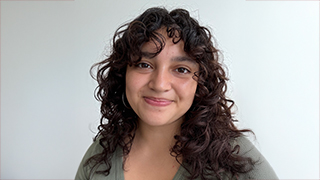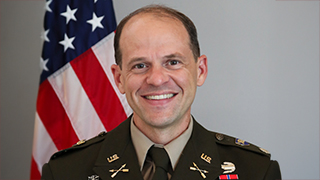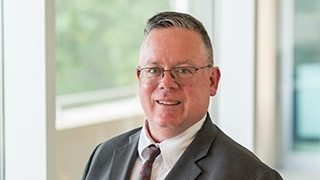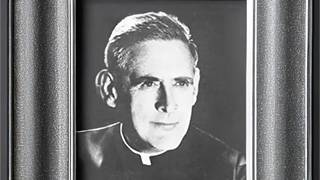Daniel Openden, CEO of SARRC, Inspires Seton Hall Students with Insights on the Power of Networking
Wednesday, May 21, 2025
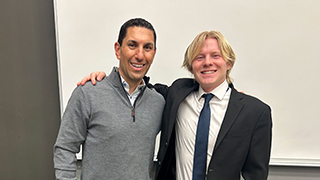 Daniel Openden, CEO of the Southwest Autism Research & Resource Center (SARRC), delivered an engaging and impactful presentation at Seton Hall University, titled
“The Power of Your Network: Building and Maintaining Relationships to Get Things Done.”
Openden’s insights left a lasting impression on students, offering practical strategies
to build and leverage networks for professional success.
Daniel Openden, CEO of the Southwest Autism Research & Resource Center (SARRC), delivered an engaging and impactful presentation at Seton Hall University, titled
“The Power of Your Network: Building and Maintaining Relationships to Get Things Done.”
Openden’s insights left a lasting impression on students, offering practical strategies
to build and leverage networks for professional success.
The event, held in Schwartz Hall, was organized with support from the AI Club, Hall Street Fund, Buccino Leadership Institute and other campus partners. Sander Dawson, a sophomore in the Buccino Leadership Institute, spearheaded the six-month project of bringing Openden to campus, ensuring that Seton Hall students had the opportunity to learn from an inspirational, seasoned leader.
A theme central to Openden’s presentation was the notion that “your network is your net worth.” He reinforced this concept by sharing a compelling story about how SARRC successfully acquired a new, central autism campus — a feat that required a vast network of individuals with diverse expertise. “Without the web of relationships I had built over the years, there’s no way we could have pulled it off,” Openden reflected. “It was a powerful reminder that success isn’t a solo journey. It’s about tapping into the collective strength of your network.”
“Proximity is power,” a mantra the CEO lives by, further highlighted his previous advice, as he encouraged students to recognize that everything they do, whether hobbies, sports or volunteering, offers an opportunity to build one’s network. He also offered advice to students, managers and future leaders, urging them to “get out of the office and make connections. Building relationships doesn’t happen behind a desk. It’s part of your job whether in the job description or not.”
Another important takeaway was the idea that networking is not just about taking but also giving. Openden stressed the “give, give, get” paradigm, highlighting the importance of being a connector: someone who eagerly seeks to help others and put them in touch with people that may help them. “In order to get, you have to be willing to give,” he explained. “Be the person who knows how to help, or if you can’t, know someone who can and be willing to connect them.”
Next, Openden stressed the importance of active listening. He reminded the audience, “we have two ears and one mouth so that we can listen twice as much as we speak,” especially at networking events, try to genuinely and authentically connect with one individual, rather than looking over someone’s shoulder at another great connection opportunity.
He also urged students to get personal in their approach to relationship-building, noting that meaningful connections go beyond professional exchanges. “If you want to build lasting relationships, you need to get to know people. Remember their names, ask about their families and pay attention to the little things,” he said. He suggested using a Customer Relationship Management (CRM) system like one’s “notes” section of the contact application in a cell phone to store and track details over time for easy access.
Following up was another critical point that Openden emphasized. “Following up is where most people miss the mark,” he noted. “If you don’t stay engaged, you risk losing the connection. Relationships need to be nurtured.” He advised students to take notes during presentations and always follow up with speakers by introducing themselves, asking a thoughtful question or making a specific comment. He also encouraged them to create multiple touchpoints to strengthen relationships, emphasizing that “it takes about seven touchpoints for something to stick, and the same goes for building relationships.”
Openden shared additional professional tips for building and maintaining relationships, including introducing yourself to speakers after presentations, strategically dropping names of mutual contacts when appropriate and actively seeking out opportunities to give back. He stressed that taking consistent action in building relationships ensures that connections remain strong and meaningful.
Reflecting on the event, Sander Dawson expressed how impactful Openden’s insights were for the Seton Hall community. “Daniel’s insights were eye-opening. He didn’t just talk about networking in theory — he gave us practical, actionable steps we can use immediately to strengthen our connections and build professional acumen,” Dawson said.
Mary Kate Naatus, Ph.D., assistant provost and dean of Continuing Education and Professional Studies, echoed these sentiments. “Daniel’s advice is incredibly valuable for our students. His focus on building authentic relationships, listening and following up, along with very practical and tangible examples, provides our students with a toolkit that will serve them well as they build their careers,” she said.
As the event concluded, students left energized and equipped with a deeper understanding of how to build and sustain meaningful professional networks. “The energy in the room was incredible,” Dawson added. “I’m beyond grateful to the AI Club, Hall Street Fund, Buccino Leadership Institute and everyone who made this event possible.”
With Daniel Openden’s guidance still resonating, Seton Hall students are poised to leverage their networks, be in the right rooms and take bold steps toward achieving their goals.
Categories: Business, Campus Life

